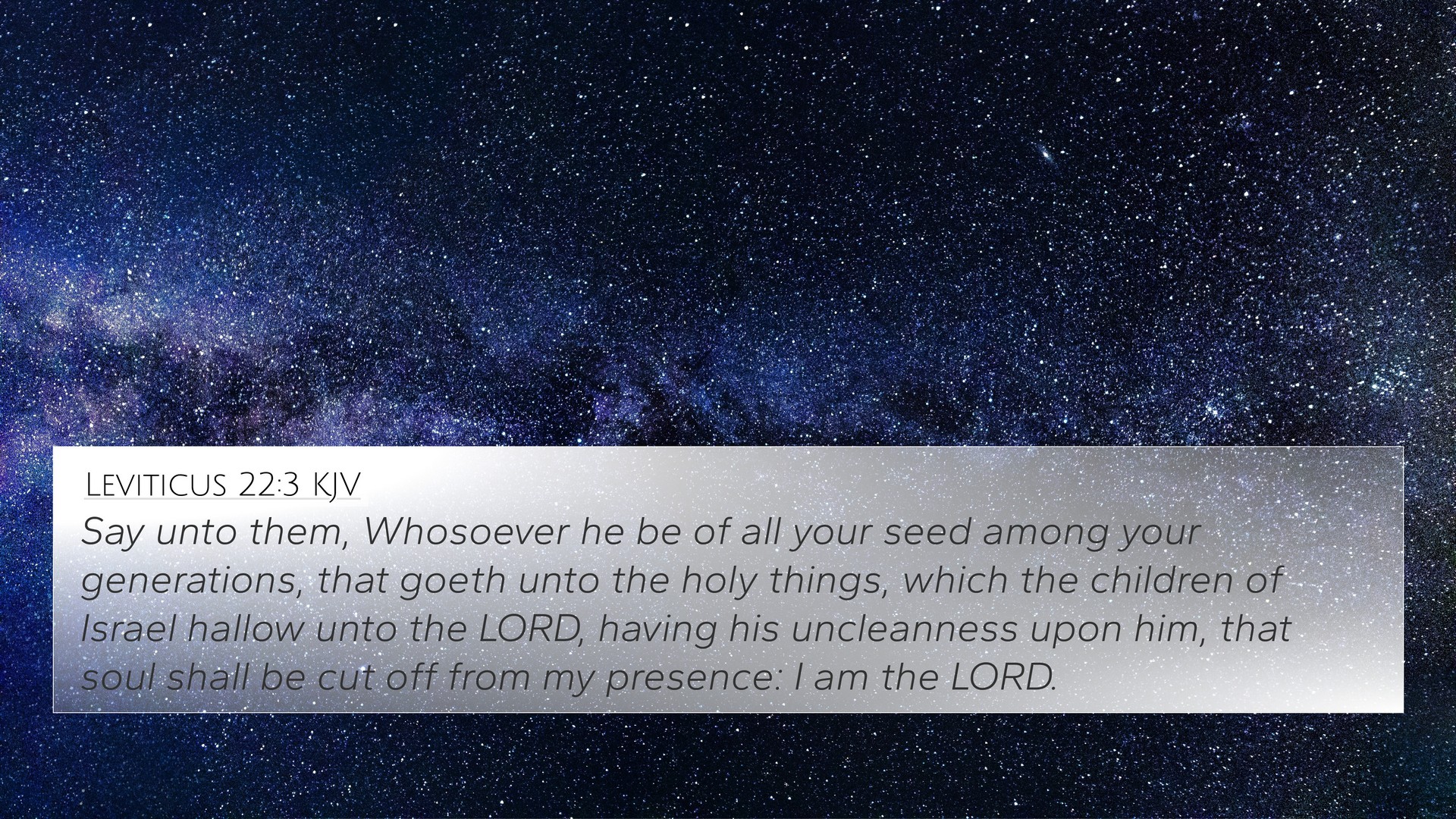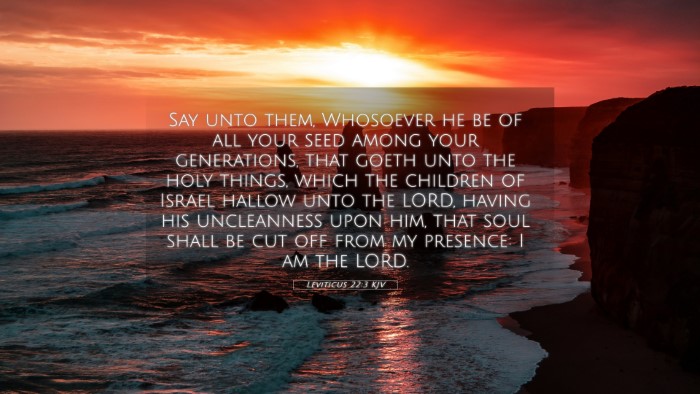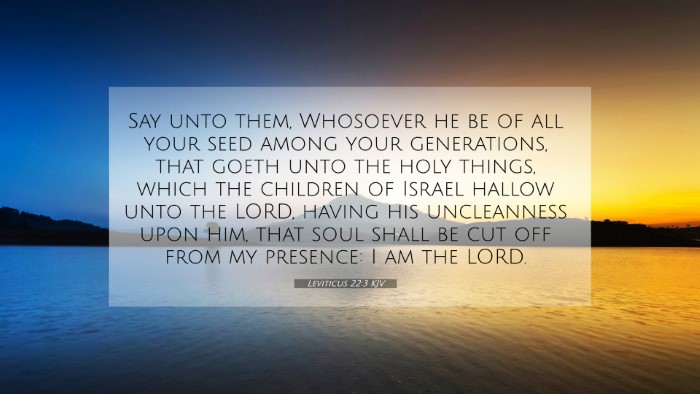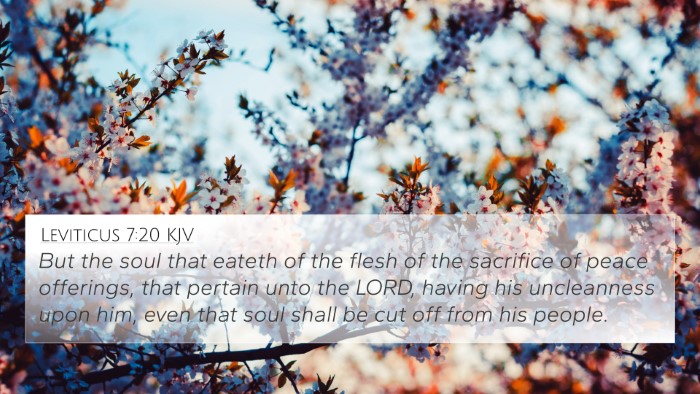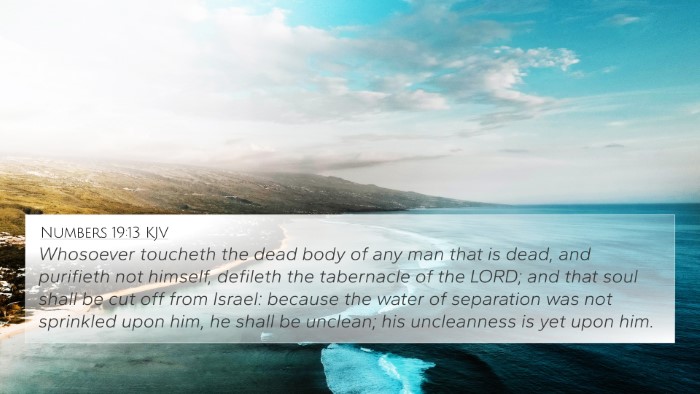Understanding Leviticus 22:3
Leviticus 22:3 states: "Say to them: If any of your descendants, throughout your generations, approaches the sacred offerings that the people of Israel dedicate to the Lord, while he has an uncleanness, that person shall be cut off from my presence: I am the Lord."
Summary of Key Concepts
- Divine Holiness: The verse emphasizes the holiness of God and the necessity of purity when approaching Him.
- Covenantal Relationship: The call for a clean approach signifies the covenantal relationship between God and His people.
- Consequences of Uncleanliness: The stern warning indicates that approaching God while unclean leads to serious repercussions.
Insights from Commentaries
Matthew Henry: Henry emphasizes that the offerings made to God must be approached with reverence and purity. He connects this to the Greater demand of holiness in the New Testament, where believers are called to present themselves as living sacrifices. The phrase "cut off from my presence" indicates severe consequences in the community for those who disregard God’s commands.
Albert Barnes: Barnes highlights the ceremonial laws provided to the Israelites as means to maintain cleanliness and separation from sin. He interprets God's warning as a prelude to understanding the gravity of spiritual defilement and stresses the need for inner purity alongside ceremonial purity when approaching the Divine.
Adam Clarke: Clarke points out that uncleanness could arise from various life situations and that God was concerned with the heart's attitude as much as with external compliance. His insights remind readers that God's standards are both spiritual and practical, aiming to foster a genuine mindfulness of one’s standing before God.
Cross-References for Better Understanding
To gain a deeper comprehension of Leviticus 22:3, it's crucial to explore related scripture. Here are some pertinent cross-references:
- Exodus 30:10: Discusses atonement for uncleanliness.
- Numbers 19:20: Outlines consequences for failing to purify oneself.
- Isaiah 59:2: Explains how sin separates us from God.
- Hebrews 12:14: Highlights the need for holiness in our relationship with God.
- 1 Peter 1:16: Reflects the command to be holy as God is holy.
- James 4:8: Encourages drawing near to God, with the promise that He will draw near to us, contingent on our purification.
- Matthew 5:8: Speaks of the blessedness of the pure in heart and their vision of God.
Thematic Bible Verse Connections
The themes of purity, holiness, and the nature of God’s relationships with His people are pervasive throughout Scripture. The Old Testament laws serve as a precursor to the New Testament teachings. Connecting these dots forms a rich tapestry of understanding:
- Purity in Worship: Patterns arise in both the Old and New Testaments regarding the necessity of being clean to approach God.
- Consequences of Sin: The idea of being "cut off" resonates through various scriptures, underpinning a broader theme of divine justice.
- Greater Holiness Required: Jesus' teachings elevate the call to holiness beyond mere ritualistic observance to heart-level transformation.
Why Cross-Referencing Matters
Utilizing tools for cross-referencing biblical texts enhances our understanding of the Scriptures as a unified whole. Thematic Bible verse connections reveal how different parts of the Bible are interwoven, allowing for comprehensive study and interpretation. By employing a Bible concordance and reference guide, fining these connections becomes a clear objective in studying God’s Word.
Conclusion
Leviticus 22:3 serves as a significant reminder of the attributes of God regarding holiness and purity. Through the insights of respected biblical scholars and the application of cross-referencing, readers can gain a more robust understanding of this verse's implications. It encourages a reflective approach to one's spiritual life, aligning with the call for holiness found throughout Scripture.
